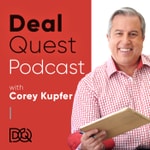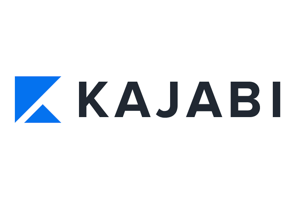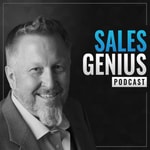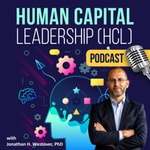DealQuest Podcast with Corey Kupfer – Détails, épisodes et analyse
Détails du podcast
Informations techniques et générales issues du flux RSS du podcast.

DealQuest Podcast with Corey Kupfer
Corey Kupfer
Fréquence : 1 épisode/7j. Total Éps: 314

Classements récents
Dernières positions dans les classements Apple Podcasts et Spotify.
Apple Podcasts
🇬🇧 Grande Bretagne - businessNews
30/10/2024#93🇬🇧 Grande Bretagne - businessNews
29/10/2024#71🇬🇧 Grande Bretagne - businessNews
28/10/2024#44
Spotify
Aucun classement récent disponible
Liens partagés entre épisodes et podcasts
Liens présents dans les descriptions d'épisodes et autres podcasts les utilisant également.
See all- https://mikemichalowicz.com/
186 partages
- https://www.coreykupfer.com/
122 partages
- https://www.coreykupfer.com/assessment
69 partages
- https://www.linkedin.com/in/coreykupfer/
131 partages
- https://www.linkedin.com/in/coreykupfer
48 partages
- https://www.facebook.com/MikeMichalowiczFanPage/
186 partages
- https://www.facebook.com/CoreyKupfer
145 partages
Qualité et score du flux RSS
Évaluation technique de la qualité et de la structure du flux RSS.
See allScore global : 58%
Historique des publications
Répartition mensuelle des publications d'épisodes au fil des années.
Episode 313: Expert Insights on M&A and Private Equity in the Lower Middle Market with Scott Weavil
Saison 1
mercredi 23 octobre 2024 • Durée 44:42
M&A expert Scott Weavil joins the DealQuest Podcast for an insightful episode!
In this episode, Scott shares his expertise on navigating the lower middle market, M&A, and private equity. He dives into the unique challenges and opportunities in this space, and provides actionable insights on how to create value for all parties involved.
In this episode, you'll learn:
- How to navigate the complexities of the lower middle market.
- Strategies for building strong relationships with buyers and sellers.
- The importance of understanding buyer motivations and expectations.
- How to focus on value creation, rather than solely on multiple arbitrage.
And much more.
Whether you’re an entrepreneur, investor, or deal-maker, this episode is essential listening for anyone looking to create value and achieve their goals in the lower middle market.
Don’t miss this chance to learn from a true expert in M&A and private equity!
• • •
FOR MORE ON THIS EPISODE:
https://www.coreykupfer.com/blog/scottweavil
• • •
FOR MORE ON SCOTT WEAVIL:
https://www.sierrapacificpartners.com/
https://www.facebook.com/sierrapacificpartners
https://www.linkedin.com/in/scottweavil/
FOR MORE ON COREY KUPFER:
https://www.linkedin.com/in/coreykupfer/
http://www.coreykupfer.com/
http://www.coreykupfer.com/dealden
• • •
Corey Kupfer is an expert strategist, negotiator, and dealmaker. He has more than 35 years of professional deal-making and negotiating experience. Corey is a successful entrepreneur, attorney, consultant, author, and professional speaker. He is deeply passionate about deal-driven growth. He is also the creator and host of the DealQuest Podcast.
Get deal-ready with the DealQuest Podcast with Corey Kupfer, where like-minded entrepreneurs and business leaders converge, share insights and challenges, and success stories. Equip yourself with the tools, resources, and support necessary to navigate the complex yet rewarding world of dealmaking. Dive into the world of deal-driven growth today!
Episode 312: Harnessing Resilience as Your Entrepreneurial Secret Weapon with Frederick Cary
Saison 1
mercredi 16 octobre 2024 • Durée 43:19
Entrepreneur and resilience expert Frederick Cary joins the DealQuest Podcast for an inspiring episode!
In this episode, Frederick shares his remarkable journey from facing significant setbacks to building a thriving business empire. He dives into his strategies for cultivating resilience and transforming challenges into opportunities for growth.
In this episode, you'll learn:
- How Frederick turned adversity into a powerful catalyst for success.
- Practical resilience-building techniques to apply in your own life and career.
- The importance of a growth mindset in overcoming obstacles.
- Strategies to maintain motivation and clarity during tough times.
- And much more.
Whether you’re navigating personal challenges or seeking new ways to enhance your professional journey, this episode is filled with actionable insights that you can implement immediately. Frederick's wisdom, combined with my expertise in deal-making, will equip you with the mindset and tools needed to thrive in an ever-evolving business landscape.
Don’t miss this chance to learn from a true master of resilience!
• • •
FOR MORE ON THIS EPISODE:
https://www.coreykupfer.com/blog/frederickcary
• • •
FOR MORE ON FREDERICK CARY:
https://www.instagram.com/officialfredcary/?hl=en
https://www.facebook.com/IdeaPros?_rdc=1&_rdr
https://www.linkedin.com/in/frederickcary/
https://www.ideapros.com/
https://fredcary.com/
FOR MORE ON COREY KUPFER:
https://www.linkedin.com/in/coreykupfer/
http://www.coreykupfer.com/
http://www.coreykupfer.com/dealden
• • •
Corey Kupfer is an expert strategist, negotiator, and dealmaker. He has more than 35 years of professional deal-making and negotiating experience. Corey is a successful entrepreneur, attorney, consultant, author, and professional speaker. He is deeply passionate about deal-driven growth. He is also the creator and host of the DealQuest Podcast.
Get deal-ready with the DealQuest Podcast with Corey Kupfer, where like-minded entrepreneurs and business leaders converge, share insights and challenges, and success stories. Equip yourself with the tools, resources, and support necessary to navigate the complex yet rewarding world of dealmaking. Dive into the world of deal-driven growth today!
Episode 303: The Hidden Struggle of Founder Depression After Business Exit with Corey Kupfer
Saison 1
mercredi 14 août 2024 • Durée 23:48
Join me for this episode of the DealQuest Podcast, where I address the emotional and practical challenges entrepreneurs face after a successful business exit. We delve into the often-overlooked issue of founder depression and explore strategies for navigating the emotional aftermath of selling a business.
Discover how to find new purpose and fulfillment post-exit, and why it's crucial to plan for these emotional transitions in advance.
Don’t miss out as I share valuable insights and strategies for a smooth emotional transition.
• • •
FOR MORE ON THIS EPISODE:
https://www.coreykupfer.com/blog/founderdepression
• • •
FOR MORE ON COREY KUPFER:
https://www.linkedin.com/in/coreykupfer/
http://www.coreykupfer.com/
http://www.coreykupfer.com/dealden
• • •
Corey Kupfer is an expert strategist, negotiator, and dealmaker. He has more than 35 years of professional deal-making and negotiating experience. Corey is a successful entrepreneur, attorney, consultant, author, and professional speaker. He is deeply passionate about deal-driven growth. He is also the creator and host of the DealQuest Podcast.
Get deal-ready with the DealQuest Podcast with Corey Kupfer, where like-minded entrepreneurs and business leaders converge, share insights and challenges, and success stories. Equip yourself with the tools, resources, and support necessary to navigate the complex yet rewarding world of dealmaking. Dive into the world of deal-driven growth today!
Episode 213: A Discussion on Business Partnerships with Corey Kupfer
Saison 1
mercredi 4 janvier 2023 • Durée 31:16
I’ve frequently talked about various alliances in businesses, but today let’s specifically discuss business partnerships. At its core, choosing a business partnership is a deal, and so for many, choosing a business partner is their first deal. If you’re going into a business partnership, it’s just like any other deal, and requires the same consideration and respect.
A BREAKDOWN OF BUSINESS PARTNERSHIPS
What I mean when I say “partnership”, I mean that from a business (not legal) point of view; namely, two or more people who come together to have joint ownership of business in whatever legal form that might be. This includes, general partnerships (which are almost never recommended), limited partnerships, limited liability companies and corporations.
Your choice of business partner structuring is dependent upon several criteria. This may include, but is not limited to:
- Your type of business
- You and your prospective partners’ goals, not just for the business but personally, as well
- Tax structuring between states and countries
- How each partner wants to be involved in various aspects of the business
- Location of the business
- Location of each prospective partner
- The future potential for bringing in more partners
- Growth potential and expectation
My firm, Kupfer & Associates, deals with many aspects of the legal side of forming business partnerships, from writing up the paperwork to begin a business partnership, to dissolution of partnerships. Our goal is to provide a process that moves in a positive manner for all our clients and their deals – the workings of a business partnership is no different.
STARTING A BUSINESS PARTNERSHIP
There’s a limitless number of reasons as to why people are drawn together to form a business partnership, but the two main one’s you tend to see are:
- Friends, relatives, coworkers, former classmates, etc. with a common goal in starting a business
- A person has a business goal in mind and specifically starts seeking others to begin a partnership with based on a myriad of reason; be it seeking a specific skill set, expertise, or funding
There is no wrong reason to start a business partnership; nonetheless, there will always be advantages and disadvantages to how you go about obtaining a partnership. For example, forming a partnership with a close friend or relative provides you with firsthand, personal knowledge of the person/people you will be doing business with. While knowing who you’re going into business with is vital, it might strain the personal relationship, especially in any potential adverse situation.
On the contrary, when you seek out an unfamiliar person to partner with, you lack that pre-existing personal knowledge. Building a business partnership can be and often is a personal experience that requires trust, so you will need to spend some time developing trust and knowledge, which can take a fair bit of time, thus slowing down any expected timeline you may have.
Thoughtful and meticulous due diligence is important in any deal; finding and beginning a business partnership is no exception, no matter if you’ve just met your prospect, or you’ve known your prospect for 20 years.
Regardless of the who, your due diligence should include, but is not limited to, looking at:
- Personal background
- Financial background
- Legal background
- Cultural background
- Personality – IE: do you get along well?
- Shared goals, values, and expectations
THE BENEFITS AND DOWNSIDES OF A PARTNERSHIPS
There’s plenty of reasons for wanting to begin a business partnership. There benefits are also vast. They include, ideally:
- Someone who is as committed and vested to the business as you are
- Someone with whom to share the responsibilities
- Someone with whom to share the burdens
- Someone who you can brainstorm and work with to evolve the business
- Someone who can help keep you in check
While you can bring in employees to cover many of the above areas, a partner is often more valuable than an employee in many of these areas simply because of their commitment and vested interest in the company. A partner with a stake in the company is, of course, going to have more to lose, and thus be more vested, than someone who is hired to take on certain things. That’s not to say an employee doesn’t care about your business, but their interest in the business’s success and growth isn’t going to be as deep as someone who has that same vested interest as you do.
Depending on your personality, your goals, your circumstances, and even the type of business you want to start, the benefits of having a partnership can easily become the downsides. You can’t just do what you want with the company. You have to work in collaboration with others and take into consideration their goals, values, and expectations.
ALIGNMENT AND THE EVOLUTION OF A BUSINESS PARTNERSHIP
You’ve chosen the who, you’ve sorted out the how, and you’ve built your business. Keeping alignment with your partnership(s) is critical to making your business grow and succeed. Generally speaking, I always encourage people to listen to the market and their clients when growing. With that I don’t mean ignoring your – or your partner’s – goals and expectations, but remain conscious and sensitive to where the market is at or what your clients are asking for is going to help your business grow, as well as keep up with demand and remain competitive.
A lot of times, this can mean steering off course from your original plan. Both you and your partner(s) need to be adaptable in your goals and expectations. Without this adaptability, your partnership alignment can quickly fall out of sync, which undoubtedly will create problems.
If you find your partnership desynchronized, it’s important to take stock of what is causing the issue and how to resolve it. Sometimes that will mean formulating an exit, which can be done with minimal damage and with amicability. Conflict of vision or expectation does not have to mean the death of a relationship or business.
ANTICIPATING THE EVENTUALITIES
It’s important at the start of a business relationship to expect all sorts of scenarios, including how to handle an exit. From the legal standpoint, your legal team is going to want to anticipate any and all potentialities to the best extent possible and how to handle them, and get them in a legal document. While it absolutely is great practice to get as much in writing as possible, it’s impossible to predict every single potential scenario, positive or negative.
Provisions made in your legal documents for partnership can be a roadmap to how to handle situations you may not have anticipated at the start. You may have a provision made for a potential exit, but you can’t possibly come up with every possible reason for, and outcome of, an exit.
Deciding in the beginning on a general methodology of Circumstance X will provoke Outcome Y will be beneficial later down the road if Circumstance X happens. If it does happen, then sorting out the specifics to achieve Outcome Y will be much more fluid, and result in less headaches and legal troubles.
• • •
Corey Kupfer is an expert strategist, negotiator, and dealmaker. He has more than 35 years of professional deal-making and negotiating experience. Corey is a successful entrepreneur, attorney, consultant, author, and professional speaker. He is deeply passionate about deal-driven growth. He is also the creator and host of the DealQuest Podcast.
If you want to find out how deal-ready you are, take the Deal-Ready Assessment today!
Episode 212: An M&A Matchmaking Firm with Brian Scanlon & Joe Zanca
Saison 1
mercredi 28 décembre 2022 • Durée 46:58
DealQuest Community, this week I bring you another triple discussion. This week I have Brian Scanlon and Joe Zanca, Managing Partners of Dealgen Partners. DealGen Partners is a Deal Orientation company sourcing deals for Private Equity Funds, and Strategic Acquirers. Currently, Dealgen Partners manages $2.7B in buy-side mandates.
THE “PARTNERS” IN DEALGEN PARTNERS
Neither Brian nor Joe had any idea in their younger years that they’d end up in the M&A Space. As with many young boys, they both dreamt of being sports stars. Brian recently found a “What Do You Want to Be When You Grow Up?” paper from his 6th grade year of school, and there was no doubt his eye was on a specific prize: Shortstop for the New York Yankees.
Joe also dreamt of being a baseball player. Growing up with his father as a firefighter, Joe said to himself that if baseball didn’t work out – which it didn’t – he would become a firefighter like his father. His brother is now a firefighter, working alongside their father, and Joe has found himself in the business universe, having started his own storage company business in college with teammates from his baseball team. The business model was literally in the basement, specifically the basement of a teammate’s parents’ home, however storing other students’ belongings in a home basement proved to be a great business idea for 20-year-old Joe. This company continued for 8 years before Joe finally sold it to move along his career.
Brian’s start into business was a coincidence – his aunt had a PR firm based in New York. In 2007, one of her clients showed great interest in the up-and-coming social media site, Facebook. His aunt didn’t understand Facebook, so she offered him $500 a month to curate and upkeep the client’s company Facebook page. As time went on, and the interest in Facebook took off, his aunt continued to send her clients to Brian for social media, and even started gaining his own clients.
Brian began his investment career after selling his marketing firm, Social Mediators in 2014, and joining the Sell Side M&A Advisory space through O’Hare Management. Brian established a strong network in the Investment Banking space during his time at O’Hare. In 2016, Brian founded DealGen Partners with the goal of providing quality deals to companies in the acquisition process.
Brian and Joe met at Babson College and remained friends for several years, until one day after they both had sold their businesses, it sort of clicked for both of them that they should partner up and build something great.
A VIEW FROM THE SELL SIDE
Brian’s background has allowed him an insider’s view of the sell side of a deal, a literal crash course in how deals can fall apart. Seeing these deals, in his words, “crumble” over the years, he saw that there was a lot of opportunity to be had with the private equity groups.
The sell side of the industry also moves at a much slower pace. On the buy side, a firm can be working on several hundred to thousands of deals in a year, whereas on the sell side, those numbers will rarely go over the double digits. Brian notes that at one point, he was only working on 3 deals, whereas a buyer he was working with had some 3000 deals they were evaluating.
After seeing this stark contrast in a number of deals, Brian began to wonder if there was a way to service both sides, without as much reliance on a single deal closing. It wasn’t that he saw the grass is greener on the other side, so to speak, he was merely reaching a place of burnout, and wanted to move forward onto different things in his career. Thus, Dealgen Partners work on an estimated 70 – 80 deals at a time.
LESSONS LEARNED IN THE NUANCE OF DUE DILIGENCE
Through Brian’s perspective on the sell side of seeing many deals fall apart, especially at the 11th hour (after LOI, etc.), there were lessons in due diligence that Brian learned. He recollects two deals that fell through:
- One because a spouse wasn’t really on-board with the business being sold
- A second because the deal taking so long to complete, the seller’s numbers began to drop, and the buyer backed out because the seller’s business wasn’t performing as well.
Through seeing these reasons, and a myriad of others , causing deals to fall apart at stages at which it was essentially considered a done deal, Brian learned a valuable lesson about due diligence: Cover all your bases and leave no rock unturned.
- He could’ve checked in with the temperature of the spouse wherein the family business is being sold
- He could make sure buyers and sellers were better fits for each other
- He could make sure buyers and sellers got to know each other a bit better before entering a deal; not getting blinded by the purchase price
- He could have pushed the seller a bit harder to ensure a quicker deal timeline, or educate the seller’s lawyer that the numbers weren’t looking great at that moment, and it was important to get the deal signed
While it’s easy to chalk up something to being out of one’s control, in the deal-making process, a lot of times, this isn’t always the case. It’s important to keep your finger on the pulse of every deal to completion and ensure you’re doing all you can to complete the deal successfully; there is always more you can do. This is a good lesson in not only being proactive during due diligence, but also how nuanced and meticulous one’s due diligence must be to ensure the deal, lest it fall apart.
THE ENTREPRENEURIAL STEP
For Joe’s experience with running his college business, he learned about the many reasons for selling a business. Some of those reasons include:
- A joint owner buying out another owner
- An owner wanting to step back or totally away from the company
- New opportunities
- Industry changes
- Partner disagreements
In Joe’s case with the storage company, his partners wanted to take the company in one direction, and he wanted to take it in another. In the end, his partners bought out his equity, and Joe continued his path forward – still very much in positive friendship with these former partners, and the company still exists today.
DEALGEN PARTNERS
By the time Joe was exiting his storage business, Brian already had his motions in gear for what his next step was. They then decided to bring Joe in as a partner, as they both felt they knew each other well enough and had seen each other in business to know they would work well together.
Dealgen works primarily with PE (Private Equity) Funds. Per a tagline on the Dealgen Partners website (www.dealgenpartners.com): “We find the deal you wish you knew about. You close them.” An eloquent way to sum up the services Dealgen Partners offer. They have grown a vast network of trusted partners, utilizing that network with proprietary outreach strategy in order to bring PE firms the ideal targets for their deal criteria – a facilitator of deal courtships, in a way.
A CRAFTED OFFER
Even the most desired deals take time to unfold and build. Dealgen Partners has built a formula for their company to offer to their clients the best opportunity to be successful within the dealmaking relationship.
- Dealgen does the business development for the clients
- The clients will be able to save themselves significant time – as finding a business looking to sell takes a lot of resources and time
- Dealgen takes on the burden of finding those companies wanting to sell
- Apply their marketing skills as being business owners and entrepreneurs themselves
This is a great setup, right? So how does Dealgen Partners structure their offer for their clients? Dealgen charges a working capital deposit at the beginning of the relationship with a PE firm or strategic buyer. That deposit buys:
- One year’s worth of Dealgen’s service
- Exclusivity to a vertical. For example: If you’re looking to buy specifically cybersecurity companies, when a cybersecurity company comes across Dealgen’s radar for sale, this exclusivity allows you to be the first to be given the chance to purchase.
- If one of their clients does not acquire a business within 12 months, the retainer is refundable.
By taking on this risk, they found a way to really set themselves apart from the marketing agencies.
WHO DEALGEN WORKS WITH
Dealgen Partners are retained and paid strictly by the buy side, whether it’s a Private Equity Fund or a Strategic Acquirer.
This places Dealgen in an interesting position wherein they can approach a number of sellers with an expansive network of serious buyers. They can, with certainty, approach the sellers and present they are going to be bought for the most amount of money possible. In an industry where there tends to be more buyers than sellers, this confidence and guarantee becomes extremely attractive to sellers.
Their paradigm also allows them to operate in a way that an Investment Banker doesn’t necessarily have. By operating as a matchmaker or liaison of sorts, this veil of you’re working for one side and one side only tends to not exist, allowing for comfortable familiarity and trust to be built in all directions.
Now of course, they’re extremely loyal to their clients – the buyers. They certainly aren’t playing both sides of the field, however, they’ve crafted their business to allow them to remain loyal to their clients, while simultaneously forming positive relationships with sellers, which is a very unique position.
Dealgen Partners is confident in their skills, experience, and network. They are more than willing to go that extra distance in all avenues of an M&A deal. By giving the guarantee to their clients, forming positive relationships with sellers, and building their offer for the clients in the way they have, it takes a lot of the risk pressure off the clients and ensures everyone finds the utmost satisfaction.
• • •
FOR MORE ON BRIAN SCANLON:
https://www.linkedin.com/in/brianscanlondeals/
FOR MORE ON JOE ZANCA:
https://www.linkedin.com/in/joe-zanca-8b154559/
FOR MORE ON DEALGEN PARTNERS:
Dealgen Partners are currently available to any Investment Bankers, M&A Advisors, Founders or Fund Managers who are looking to sell their business.
https://dealgenpartners.com/
Corey Kupfer is an expert strategist, negotiator, and dealmaker. He has more than 35 years of professional deal-making and negotiating experience. Corey is a successful entrepreneur, attorney, consultant, author, and professional speaker. He is deeply passionate about deal-driven growth. He is also the creator and host of the DealQuest Podcast.
If you want to find out how deal-ready you are, take the Deal-Ready Assessment today!
Episode 211: Happy Holidays DealQuest Family
Saison 1
vendredi 23 décembre 2022 • Durée 07:52
Episode 210: A Dive Into Financial Due Diligence with Pierre-Alexandre Heurtebize
Saison 1
mercredi 21 décembre 2022 • Durée 45:32
In 2019, Pierre-Alexandre Heurtebize launched one of the first financial due diligence practices, HoriZen Capital, which is 100% dedicated to SaaS businesses, and launched the first online course on how to conduct financial due diligence. As an ESSEC MBA alumni and PwC Transaction Services alumni, Pierre has accumulated nearly 10 years of financial due diligence experience, which includes 3 years fully dedicated to reviewing SaaS and subscription models. Prior to launching HoriZen Capital, Pierre spent many years as a Private Equity Investment Associate and M&A Advisor. His background has afforded him a unique and professional understanding of the process of professional investors. He has also written articles on FDD, M&A, and financial analysis for top-ranking websites such as TechCrunch, Toptal, and MicroAcquire.
Through reading a lot of Disney’s Mickey Mouse and Scrooge, by around the age of 12, Pierre knew he wanted to be a trader,but his idea of a trader at twelve-years-old wasn’t totally correct. He imagined traders were “people who would look at the newspaper, understand what’s happening from a geographical perspective and a geopolitical perspective in South America, figure out if there is a conflict in that country that impacts the production of oil and gas in another country, and then one thing leading to another… The price of a pen is going to skyrocket. So, let’s just by pen stock.” While his Disney perception of what a trader was wasn’t entirely correct, it was still a relatively sophisticated analysis for that age.
As he grew up, he learned what traders actually were – not something he actually wanted to be – and he found great interest in understanding the work, and how to use that knowledge to make good business investments.
A UNIQUE DEAL
Pierre’s first deal occurred about a decade ago, and involved investing in a wind turbine plant in France through a crowd-funding platform. The aim of the proposed wind turbine project was to bring wind-generated energy within the city streets – for instance Paris – by designing the turbines in the shape of trees, wherein each branch was the turbine.
This concept of designing something man-made to blend in with natural surroundings is called “biomimicry”. Recently, especially in the alternative energy discussion, biomimicry has become very popular to help preserve and blend in with the natural environment.
Investing in creating wind turbines designed to mimic nature isn’t something investors hear about every day. Pierre was interested in the equity investment scene, so he began doing research online, where he stumbled across the crowd funding platform. Initially he began to think he could utilize this platform to become a venture capitalist on his own, especially after finding the wind turbine project. The wind turbine project not only fascinated him, but he found it to be the most efficient wind turbine execution available.
FROM CROWD-FUNDED WIND TURBINES TO PRIVATE EQUITY
This browsing of a crowdfunding platform soon evolved to Pierre entering into private equity. When he was interning at a company that focused on hip-hop and urban media. The company was in the process of being acquired – this was his first experience with private equity. By the time he entered his third internship, he had decided to take the leap fully into private equity.
He began his venture into private equity through BNP Paribas Private Equity, which at that time, was branching off into Isatis Capital Team. Being a part of this journey proved to be good timing for Pierre, as this spin-off from BNP Paribas into Isatis allowed the team to essentially become independent. During his first year with Isatis, they worked on fifteen deals with five being completed. Isatis isa successful independent private equity firm today, and still growing.
EXPECTATION MEETS REALITY
During his schooling, Pierre says there are many resources at your disposal in order to learn the processes of business. This is true for almost all education, you have virtually limitless resources at your hands, without much struggle to find the information you need,however that information never fully prepares you for the real world. In the real-world, thenecessary resources and information aren’t as easily accessible. You can ask, but often you are you’re going to have to go out and find them on your own. A lot of this information you’ll require is imperative to your due diligence when in the M&A space; one piece of incorrect or missing information in the due diligence stage, and you can easily flip your deal upside down.
Another issue that comes up in the due diligence and information gathering phase is that you get a lot of information at once, most of which is disjointed or not exactly useful to your fact-finding mission. This is where ensuring your due diligence skills are sharp comes in handy. You have to be able to:
- Sort through the information efficiently
- Discern what information is useful, and what is not
- Understand the information given to you clearly
- Be able to utilize that information to be used practically in the deal-making process
Without the ability to do all these things, you once again will have a hard time creating a successful deal.
LESSONS LEARNED IN DISCERNMENT AND DISTINCTION
As we’ve established, schooling doesn’t fully prepare you for real-world navigation and application of due diligence. Pierre recognized this gap between formal education and being in the business world without the proverbial training wheels school offers you,but recognizing this gap didn’t come without his own lessons and experiences.
Of course, when it comes to dealmaking, every person who has a seat at the table is there for a purpose, you benefit from the individual and combined experience of each person at the table, and logically, the more experience you have – especially specialized experience – the easier it gets. To make your overall experience as easy as possible, you want to make sure you’re bringing to the table your skillset at its sharpest – and this especially includes your ability to effectively do due diligence.
Discernment and distinction in what we outlined above is priority. Without the ability to effectively discern and make distinctions between information given to you, your deal will likely struggle. A general guideline Pierre gives is: Discern what are the highest priorities, and ensure they are covered; then, if you have the time, work yourself down the list of non-high priority items. Deciding what is high priority includes:
- Make sure you understand revenue generation – Are you at risk of losing revenue going forward?
- Understand the markets – Are you sure the market is going to thrive, or is the market large enough?
- Identify any red flags – Identifying what can go wrong, and if and how it can be prevented.
Beyond those, the biggest surprise for Pierre in the adjustment from being a student to an actual professional was in the valuation process. In school you learn about DCF (Discounted Cash-Flow), the mathematics behind it, how your discount factor must be reflective of the industry you’re in, etc. Then you go into small cap private equity – large cap is a different conversation – and the precision of what you learned in school is much looser. The smaller the deal, the more apt it is to just be whatever the parties end up negotiating. You really will need to adapt to the person in front of you when working on smaller deals, and a lot of times that means a lot less technicality to the deal.
SAAS AND SUBSCRIPTION-BASED BUSINESSES
As Pierre’s experience and talents were nurtured, he began to see that he was prepared to go out on his own and begin his own business. Pierre chooses to focus on SaaS businesses versus any other business because he finds them to be quite easy, stating once you develop the software, it’s quite simple to operate.
To refresh: A SaaS (Software as a Service) company, as defined by DigitalGuardian.com, is a company that “maintains servers, databases, and software that allow the application to be accessed over the internet — most likely by web browsers. Users can access the software from almost any device.”
Pierre finds the easiness with focusing on SaaS and subscription-based businesses comes from:
- You don’t have the same logistic issues
- You don’t have inventory
- You really don’t have any networking capital
- Your focus at that stage is driving revenue and keeping your customers
WHERE’S THE FOCUS?
When it comes to SaaS and subscription-based companies, customers are key. Your goal is to ensure you have a loyal customer base that will stick with you. When you start a SaaS business, your first initial customers are going to be the ones that will stick with you through your company’s lifetime; they really want the product you’re offering. As you bring in more customers, those customers are less likely to automatically be desiring to stick with you, so you need to figure out the best way to retain those customers for as long as possible.
While bringing in new customers is great, you want to do all you can to retain those new customers. If you’re losing customers just as quickly as you’re gaining them, it can have a major impact to your gross revenue;much more than if you were to establish a loyal customer base that sticks with your company through its lifespan. It can also greatly impact your company valuation, especially during an M&A deal.
THE ROLE OF PIERRE AND HORIZEN CAPITAL
Pierre has an expansive background, and he certainly can help you with the valuation process, however, his role is to be an advisor. With that comes:
- Get the word out about your company
- Get as many people around the table as possible
- Work out the whole process to ensure you get the most value
- Help you present the numbers better – making sure you’re presenting clean numbers to investors
HoriZen Capital is providing financial due diligence (FDD) services for your SaaS targets, from $100k to $50m in ARR. HoriZen Capital's objective is to advise you on your SaaS company and offer you their network of capital and expertise in order to take your SaaS company to the next level of growth. Ultimately, you will find someone who is more than happy to buy your business.
• • •
FOR MORE ON PIERRE-ALEXANDRE HEURTEBIZE AND HORIZEN CAPITAL:
https://horizencapital.com/saas-due-diligence-services
The HoriZen Capital Team is currently raising their Tech Investment Fund: Finding great SaaS product with poor SEO, Conversion Rate and Paid Ads Execution, providing money for growth and applying their growth marketing playbook. To learn more, check out: https://horizencapital.com/tech-fund/
Corey Kupfer is an expert strategist, negotiator, and dealmaker. He has more than 35 years of professional deal-making and negotiating experience. Corey is a successful entrepreneur, attorney, consultant, author, and professional speaker. He is deeply passionate about deal-driven growth. He is also the creator and host of the DealQuest Podcast.
If you want to find out how deal-ready you are, take the Deal-Ready Assessment today!
Episode 209: M&A Talk with Leading RIA Aggregators and Integrators: Bob Oros of Hightower Advisors
Saison 1
vendredi 16 décembre 2022 • Durée 53:03
Bob Oros is Chairman and CEO of Hightower Advisors, a national wealth management firm focusing on empowered investing for independent-minded financial advisory businesses to drive growth and help clients achieve what they call “Well-th Rebalanced.” With more than 25 years of experience, Bob spent the bulk of his RIA career at the large custodians, such as Schwab and Fidelity, recruiting, retaining, and supporting advisors. Since joining Hightower in 2019, the company has completed a number of acquisitions of high-profile independent wealth management firms, expanded its operational and business acceleration services for advisors, and achieved consistently strong organic growth.
In addition to his position at Hightower Advisors, Bob is involved with, and a part of, several social improvement organizations. He sits on several boards, including The Chicago Mental Health Association and EEqual, a not-for-profit focused on providing opportunities for students who are battling homelessness. He is passionate about the cause of financial literacy, and speaks to student groups, as well as contributes frequently to panels and thought leadership pieces.
In his adolescence, Bob had no superhero ambitions, however he definitely had no issue working hard for what he wanted. A self-denominated “hustler” as a child, Bob would wake up at 5:30 AM to work a multitude of odd jobs around his neighborhood, including lawn-mowing and paper routes. Clearly his entrepreneurial mindset began at an early age.
THE EVOLUTION OF HIGHTOWER
Back in 2008 -- at Hightower’s founding -- the company was a revolutionary idea. Long before Bob came into Hightower, back when they were not in the M&A business, I had the pleasure of coming in and doing a full day’s white-boarding session with the executives at the time to check the landscape of entering the business of M&A.
Once Hightower entered the acquisition market, my firm was involved in some of their early deals from the sell side, representing several of their affiliated advisors in the sales of their businesses to Hightower. It has surely been interesting and a real pleasure to see where Bob has taken Hightower. Under Bob’s leadership, Hightower has made an impressive 35+ deals.
Part of what makes the 15-year-old company so stable is Bob’s belief in flowing with the tides and evolution. The RIA world is still relatively in its infancy, so it’s going to be ever-changing. Bob’s commitment to keeping Hightower relevant and evolving supports Hightower’s growth prospects for long into the future.
HIGHTOWER’S DEAL TEAMS
In 2016, Hightower completed its first successful deal. While Bob was not a part of Hightower at that time, it’s still a very important moment in the Hightower history books, but getting to the point of making 15+ deals a year with 3 deal teams is no simple feat. It takes clever strategy, experience, and operating deliberately. Bob impresses the serious nature of the industry and urges buyers and sellers alike to not take it lightly. In fact, if you’re not prepared with not only enough capital, but the right know-how, it’s very easy to do a lot of damage.
For Hightower, taking the industry seriously has allowed the company to:
- Divide into multiple distinct deal teams, led by a deal-lead
- Have many analysts supporting the distinct deal teams
- Have an internal sourcing team, allowing up to 50% of their volume to be created internally
- Have a team making outbound reachouts
Bob also stresses the importance of being purposeful in the direction you choose. Dealmaking is not something everyone can, or should, do. If you’re going to get into the industry, you take on an obligation to become educated and diligent in your deals.
FUNDING HIGHTOWER
The source of capital a firm has is one of the most important factors to stability and growth. If your capital source is weak, your business will be weak, ultimately making your deals weak. I’ve seen many firms falter because of unstable streams of capital. In 2018, Hightower was at a place where a fresh injection of capital was crucial; this resulted in Thomas H. Lee Partners becoming the majority investor in Hightower.
When choosing capital partners, you want to be mindful of who you're choosing. Choosing the wrong capital partners or investors can easily turn potential growth into a stalemate. When choosing your investors, Bob suggests choosing someone who is:
- Experienced and knowledgeable in the industry
- Asks great questions
- Gives great input
- Willing to help make sure the company’s decisions are sound decisions
Because of Hightower’s calculated and disciplined choice in private equity in January 2018 and the growth that helped facilitate thereafter, by December 2020 they were able to do their first equity recapitalization, which can become a useful tool with building future growth.
Given all of the above factors, Hightower knew they had a very robust opportunity, and they wanted to be entirely sure they had the right capital structure to support all the growth opportunities. The structure included:
- A secondary where Hightower recapitalized into a continuation fund
- Thomas H. Lee Partners continued to be Hightower’s primary partner
- Also bringing in 11 passive institutional investors to bring fresh growth capital
This structure has been incredibly sound and beneficial to Hightower’s strategy of driving leading organic growth. For Hightower – deals aside – the most valuable companies are companies that can generate consistent, leading same-source sales growth. Bob truly believes they’ve created such a company.
HIGHTOWER: AN INTEGRATED AGGREGATOR?
On the topic of Aggregator versus Integrator, Bob brings up what he calls “The Curve of Conformity,” which asks the question: How conforming does the buyer make the seller?
Within this “Curve of Conformity,” a low-conforming buyer would mean the seller keeps its ADV, branding, etc. etc. – typical aggregator features. Whereas, on the other side of the curve, with a high-conforming buyer, you are conforming to become them (one ADV, one brand, one tech stack, etc.) – which is more aligned with an integrator model.
That established, within Bob’s conformity curve, Hightower sits somewhere right in the middle:
- There is some conformity
- They operate under a single ADV
- There are things they do for every one of their businesses – HR, Finance, Compliance, etc.
- Single – but FLEXIBLE – technology stack
- Brand Agnostic some firms have the Hightower Brand, some have a “Powered by Hightower”, some have a brand not branded to Hightower at all. Branding is your choice and is not forced. “Whatever creates the most value is what you should do.”
- Autonomy on money management
There’s conformity in, as Bob describes, the back-office areas, but where they try to keep the autonomy and individualism is in the client value chain.
Hightower doesn’t have a single view on how you manage money; meaning, they do have the capability to help their advisors if they want to turn that over to them, however there is no requirement to do so, which really balances out to most who don't need that help, and a few do. Neither is right or wrong for Hightower.
Client satisfaction is highly important to Hightower’s “integrated aggregator” model, and advisors having the freedom to serve their clients in the way that best fits both parties is key in how their company functions. By doing things this way, Hightower’s goal is to unlock value by giving them access to scale, but also access to new capabilities that can be value-creating for their client.
In order to help determine where on the curve you belong, Bob suggests to sellers that they come to the table with their top two non-negotiable items; any more than that, and the list is too long and impossible to work with.
THE HIGHTOWER TARGET
Hightower is done with wirehouse lift-outs – so, no more breakaways. Bob doesn’t think it’s a bad strategy but Hightower is focused ontheir acquisition strategy. Their transactions of established businesses don’t really mesh well with a wirehouse lift-out, so the majority of their deals are standalone RIAs with some IDB deals.
Hightower also doesn’t take into consideration size or geography. While their history suggests their deals tend to skew on the larger side, they really do not discriminate based upon size; there is no artificial number they’re looking for. The same is true for geography.
What they’re looking for are great leaders. This is because Hightower is not attempting to come in and create a full conformity take-over, they’re coming in to build a great leadership team, take some things off their proverbial plate, and power them with new capabilities.
A bullseye target for Hightower is a relationship with great leaders and leadership teams.
• • •
FOR MORE ON BOB OROS AND HIGHTOWER ADVISORS:
https://www.linkedin.com/in/boboros/
https://hightoweradvisors.com/about-us.html
Corey Kupfer is an expert strategist, negotiator, and dealmaker. He has more than 35 years of professional deal-making and negotiating experience. Corey is a successful entrepreneur, attorney, consultant, author, and professional speaker. He is deeply passionate about deal-driven growth. He is also the creator and host of the DealQuest Podcast.
If you want to find out how deal-ready you are, take the Deal-Ready Assessment today!
Episode 208: Mortgage Note Buying with Scott Carson
Saison 1
mercredi 14 décembre 2022 • Durée 49:25
Entrepreneur, podcast host of Note Closers Podcast, and President of WeCloseNotes.com, Scott Carson, is an expert in real estate investing, raising capital, and marketing. He has a heavy focus in guesting on podcasts, speaking at industry conventions, and helping thousands of investors and entrepreneurs each year create wealth through his debt-buying classes, podcasting, and coaching. In 2022, he was named by US News Reporter Magazine as the #4 Entrepreneur to Follow.
Underneath his expertise, Scott enjoys traveling, sports, and gardening; all things that create lasting memories for him. The specialty of buying mortgage notes wasn’t what the small-town Texan had in mind. His parents had opened a local hardware store, so Scott fully believed his future would be carrying on that business, or going into sports. In his childhood, Scott was the neighborhood “that kid”, wherein he was always busy doing odd jobs for neighbors on the weekends to make some money. Halfway through his college degree in communications and journalism, he switched to majoring in business, allowing his childhood entrepreneurial mindset to later serve him to become one of the most sought-after speakers in the real estate space.
MORTGAGE NOTES & MORTGAGE NOTE BUYERS
On the DealQuest Podcast, we’ve not covered buying mortgage notes, so I’m thoroughly excited to introduce the DealQuest audience to this type of deal. To better understand these types of deals, we will first brush-up on what a mortgage note is, and what a mortgage note buyer does.
But what exactly is a mortgage note? They are defined as “a legal document that establishes the terms of a loan for both the borrower and the lender.” In layman’s, a “note” is merely an active debt.
Banks will have owed debt that isn’t performing – the borrower hasn’t paid on the debt for some time – and the banks will sell off the debt to third parties like Scott – a note buyer -- who will purchase that debt for a lump sum price from the bank. The new owner of the debt will now be responsible for collecting the debt from the borrower.
THE BUSINESS OF BUYING NOTES
Operating within the secondary mortgage note market, mortgage note buyers like Scott offer the owner of a mortgage note the opportunity to receive an upfront sum of cash rather than a series of small payments from a borrower. Scott primarily focuses on buying:
- Residential first-lien debt
- Commercial first-lien debt
- Primarily non-performing notes, meaning the borrower hasn’t paid in a certain timeframe. (For Scott, that’s anywhere from 90 days to 6 years.)
The process is straightforward: the note buyer purchases the note from the lender for a predetermined lump payment. Despite the fact the transaction between the note buyer and lender is for a fraction of the original debt, the borrower continues to have responsibility all unpaid amounts due under the original note amount; they just do not owe it to the original lender, but instead to the note buyer. This is how note buyers make their profit.
For Scott, he prefers to open a discussion with the borrower and find out what prevented them from honoring their lending agreement. Financial hardships can come to anyone at any time, and Scott wants to work with the borrower to help get them back on track. Understanding why they became delinquent on their agreement is a part of that process.
Some note buyers will restructure the debt in a way that is more accessible to repay for the borrower to get the note to perform again. This includes but is not limited to: Reducing that debt by a certain amount, adjusting the payment amounts, or adjusting the payment schedule. The profit comes from paying a smaller lump sum to the lender, and then collecting the original owed debt and interest from the borrower even if it is over a longer period of time.
To make this a profitable business, note buyers have three options:
- Continue the debt in its entirety until it is fully repaid
- Get the note back to performing status and sell it back on the market for $0.80 - $0.90 on the $1
- A third option comes into play when the note does not become performing, and they take ownership of the property via foreclosure or other applicable legal remedies.
To break this down:
A borrower accrues $50k in debt on a mortgage note and stop making payments
↓
The lender will then put the note up for auction
↓
A note buyer will purchase that note for a negotiated discounted price up front, for instance, $25k
↓
The borrower is beholden now to the note buyer to repay their debt
↓
The borrower still owes the $50k and needs to pay that off to the note buyer
↓
- The note buyer will negotiate terms with the borrower to get it to perform again
- The borrower does not respond or agree to mutually agreeable terms
↓
- A) Retain the note until the debt is paid in full – earning up to $25k profit plus interest, or
B) Sell the note for a higher percentage than purchased – earning up to $25k profit - They take over ownership of the property and sell the property
BUYING NOTES: A PRO-CON DEAL
In the context of non-performing mortgage notes, lenders – in this context, usually banks -- have all of the same options as note buyers when it comes to recouping their loss on a note. They, too, can renegotiate terms or foreclose on the property and sell it. So, why would a bank opt to sell the non-performing note rather than foreclose and re-list the property for profit, or attempt to get the note to reperform? This is the #1 question Scott gets asked.
Like all deals, there are pros and cons. And those pros and cons are going to be dependent upon what the goal of the lender is. Sometimes the cons will outweigh the pros for the lenders, sometimes the pros just won’t be enough.
When it comes to banks, it’s about leverage and velocity capital, as well as every state has their own foreclosure timeline (Texas being the fastest in the country; New York State has a multi-year foreclosure timeline). These foreclosure timelines also play a role in whether a bank chooses to take on the responsibility for the note at full, or sell it on the market to a note buyer. There are also financial and other reasons that banks don’t like to carry non-performing loans on their books plus they are not in the business of buying, managing or reselling properties and generally have no interest in being in such business.
BENEFITS OF SELLING
- They receive a lump sum for the debt, versus the small payments owed by the borrower
- They can immediately turn around and reloan their received sum to other borrowers
- The note debt is no longer their burden
- They can make back some of the lost amount on non-performing notes
- They can focus on their core business of taking in deposits and lending money and not have to worry about managing, maintaining and selling properties or dealing with the legal system.
As with any deal, the goal is to make a transaction that benefits both parties, however, many banks would rather take their hit and not the risk. They would sooner sell the note for $0.50 on $1, and immediately turn around and loan that money 10 more times, versus playing the long game and taking the risk of the borrower finally honoring the note. Having multiple non-performing notes in circulation means money is just stagnant for long periods of time, and with banks it’s about keeping that money circulating and moving at as fast of a pace as possible.
THE WEBUYNOTES MODEL
Scott and his company, WeBuyNotes.com, do not work with major national institutions such as Chase or Bank of America. This is because the notes done by larger institutions are usually $50M+; instead, they buy from regional banks, small institutions, and hedge funds for smaller sums. The reason for this is in part due to operating on a smaller scale, but also because it offers him the ability to purchase multiple, smaller notes at one time, versus one large note. Logically, this choice makes sense for his company’s size, as acquiring several notes increases the the impact of it not performing has a much larger negative impact. .
An important part of Scott’s goal is to select notes on which he can collaborate with the borrower to get them to a state of reperforming, and help people stay in their homes. However, Scott does not only buy residential notes, or sometimes there are borrowers who will not get to reperforming. As a result, there are numerous elements to consider while determining which notes he will bid on.
- What condition is the property in?
- How far into the foreclosure process is the bank?
- Whether property is vacant
- What is the estimation of repairs needed to get the property back to market ready?
- Evaluating what the likelihood of the borrower coming to the table to work on getting the note back to a performing status
- Bidding based upon on the worth of the property, not what the borrower owes
Scott’s refined considerations on whether or not to bid on a note have led him to a point where an average of 60% of occupied properties end up to a state of reperforming, and people can remain in their homes. This is a high percentage in the industry.
NOT RECESSION-PROOF
Nothing is guaranteed “recession-proof”. However, Scott’s model for WeBuyNotes.com has helped him succeed through uncertain times. The unprecedented COVID19 pandemic has claimed many businesses, jobs, and family homes. Many people could not foresee the impact the pandemic would have across the board; not just personally, but in business, as well. There is no denying that during the height of the pandemic, Scott felt the pressures.
Due to pandemic-induced financial instability for many people, more and more people began to default on loans and debts throughout 2020. While this may sound like it’s “good for business” in the context of note buying, it actually made things a bit tougher for Scott. He had to stick to his criteria and considerations for purchasing notes, be smart about his risks, and not lead with fear or over-confidence.
By remaining on task to his criteria and considerations for note buying, and remaining on top of his due diligence, Scott and WeBuyNotes.com are coming out on the other side in a strong position.
• • •
FOR MORE ON SCOTT CARSON:
Http://NoteWeekend.com
* GET A FREE TICKET WITH CODE “DEALQUEST”
Corey Kupfer is an expert strategist, negotiator, and dealmaker. He has more than 35 years of professional deal-making and negotiating experience. Corey is a successful entrepreneur, attorney, consultant, author, and professional speaker. He is deeply passionate about deal-driven growth. He is also the creator and host of the DealQuest Podcast.
If you want to find out how deal-ready you are, take the Deal-Ready Assessment today!
Episode 207: M&A Talk with Leading RIA Aggregators and Integrators: David Canter of Bluespring Wealth Partners
Saison 1
vendredi 9 décembre 2022 • Durée 44:00
Musician, Lawyer, and President of one of the nation’s premier RIA firms, David Canter, is focused on positioning Bluespring Wealth Partners as one of the premiere acquirers in the industry. He is very hands-on with operations, including overseeing day-to-day operations and identifying new areas of opportunity and growth. David has worked himself up the ladder in the space, previously serving as Executive Vice President and Head of the RIA segment for Fidelity Clearing & Custody Solutions and now serving as President of Bluespring Wealth Partners.
David has worked on many sides of the RIA space, including custody, and now acquiring, but, as most stories go, working in the RIA space wasn’t his life-long passion. Without question, he had his sights set on the entertainment industry. He based his life around going into the entertainment industry – training at one point as an actor – and has a love of music and playing his guitar. Breaking into the entertainment industry is hard; beyond acting as an extra, he found that the work just wasn’t there. He quickly had to realize that there were other avenues he could take to make money, while still keeping the arts as a deeply held passion.
Once he made the decision to focus himself elsewhere, David was drawn to law. The lure of the courtroom was undeniable to David, and he went on to pursue a Juris Doctorate from the University of Baltimore. He loved the courtroom and trial-work, and currently holds his FNRA Series 24 license and is a California State Bar member.
THE BLUESPRING ATTRACTION
David has been a jack of all trades in the best way possible, but what attracted him to Bluespring Wealth Partners after nearly three decades in the RIA space is simple: He wanted a new challenge. He wanted to find a place that met his self-evaluations for a new challenge after 12+ years at another firm. He found Bluespring’s platform very appealing. That platform is based on:
- Helping people, helping investors specifically
- Welcoming entrepreneurs
- Allowing entrepreneurs to continue to be entrepreneurs
- Doing good with the education and powers they have
For David, Bluespring Wealth Partners wasn’t just a challenge, but a fitting piece to the next chapter in his career. It allows him to be entrepreneurial, but simultaneously intrapreneurial. This balance allows David many freedoms he wouldn’t otherwise have, and a chance to build the company into something new. It is now a 29-firm platform spanning 16 states – and growing. The firm will do 9 acquisitions by the end of 2022, but not just for the sake of acquisitioning. Their acquisition plan is focused on solving the problems of their “partner firms”, as they call their network of firms.
AN INFORMED CHOICE
In the RIA space, there are many choices an investor can make just to get to the starting line. David believes in choice, and not merely having choice, but having informed choice. David understands that Bluespring Wealth Partners isn’t going to be the perfect choice for everyone, however he wants the DealQuest listeners to know what Bluespring does.
Bluespring Wealth Partners can be best described as a practice management consultancy at its core that happens to be in the strategic M&A space. It is the responsibility of practice management consultants to assist offices and firms with improving efficiency within their workplace and in their business operations. That’s the bulk of Bluespring Wealth Partners’ approach: Addressing problems with their acquired “partner firms” and problem-solving efficiency via the network of firms under Bluespring.
ONE SIZE DOES NOT FIT ALL
Two of the most commonly used words in the RIA space are “aggregator” and “integrator”. Many firms operate either pure aggregator or pure integrator, however, there are a number of firms that pick elements of either model to formulate their perfect model. There is a reason all these models exist, and that’s simply because no singular model works for every firm, entrepreneur, client, or investor.
Again, choice plays a vital role in decision for the model under which Bluespring operates. The choices David lay out are:
- Choice 1: Do nothing. Keep on moving forward as you always have, and hopefully filling your career.
- Choice 2: De-risk. For example: A firm has a retiring partner, so to pull some capital, they find a minority interest. Not take control, but merely provide some capital.
- Choice 3: Find a pure capital partner. For example: They buy 50%+, and you obtain a capital partner that’s not going to provide other shared services or contributions aside from bulk capital.
- Choice 4: Entrepreneurial model (A.K.A.: aggregation model). Keep your brand and the acquiring company will take at minimum 51% interest in your firm and build a flexible deal structure. By doing this, the focus is preserving the entrepreneurial model and providing various services to help propel your firm forward into growth within the network of acquired firms.
- Choice 5: Subsume into another brand (more commonly known as integration model). You become the larger brand, forgoing your independent brand identity for the growth of the whole institution. The larger firm will guide the smaller acquired firms in their business activities, but the goal of the smaller firms is to continue looking after their clients.
- Choice 6: Internal succession to a G2. David notes that in their initial research for founding Bluespring, they found that founders mostly prefer this route;however, the biggest obstacle is finding the capital. G2s would say they would like to pay out of cash flow, but ultimately, it’s the entrepreneur taking the risk and it’s their cash flow that will fund that transition.
- Choice 7: A combination of all of the above. Choosing the aspects of all the available models to build a Frankenstein model that works best for your goals, your future, and what you want to do with your firm.
These seven choices on how to proceed is what allows a firm to formulate how they’re going to move forward with their M&A deals. Bluespring Wealth Partners primarily functions as Choice 4, the Entrepreneurial Model, while recognizing the benefits of all models, opting to borrow practices from other models to give their entrepreneurs the best of all worlds, and allowing over half of their firms to be standalone RIAs.
- Keep their brand (For example: Capital Planning, A Bluespring Wealth Partner)
- Keep their own ADV
- Keep their client experience
- Bluespring provides capital
- A sister company Kestra Financial wherein some of their firms they’ve bought it on that chasse
THE VALUE BLUESPRING BRINGS
David affirms there are about 90% of opportunities that cross their path that they do not take. Bluespring is very transparent with those opportunities as to why they pass. By being particular in the opportunities they take, Bluespring has built an elite and strong network of firms. Offering immense value to the firms that Bluespring acquires.
One attribute of Bluespring’s consultancy is that even when they pass on an opportunity, they’re offering their consultancy to these firms to help them better grow, irrespective of Bluespring choosing to bring them into their network or not. Bluespring’s consulting really begins long before they even decide to enter into a transaction.
If Bluespring does go forward with a transaction, there’s a lot of due diligence they do by way of taking a consultative approach to how they’re going to do business together, and how they’re going to structure transactions so the right benefits, incentives, and horizons can be found.
Once a firm enters their network, they provide an array of resources to help their community network grow:
- A business consulting group
- Marketing assessments
- Large technology infrastructure
- An M&A team to help with sub-acquisitions
- Access to capital, backed by two private equity firms -- majority-owned by Warburg Pincus, and Oak Hill Capital
- Offering a training program for G2s: The G2 Successor Academy, a simulated 2-year course wherein G2s are educated and trained through guest lecturers, peer study, etc.
CHOOSING WHAT WORKS FOR YOUR SUCCESS
There is a reason why there are so many various models and combinations of models. At the end of the day, choosing your model is about you and your goals. With Bluespring, David ultimately wants to operate as a culture-driven community. Allowing their acquisitions to remain primarily autonomous, while gaining the support of Bluespring and their resources.
There is no one superior model, however each firm will always believe they’ve found the key to making a successful business. That is true in a lot of ways because success is very abstract; they are successful because their model works for them, not because they have the superior model.
Reviewing choices, building a model for their needs and goals, and understanding what opportunities should be taken and those that shouldn’t, are all keys to making Bluespring’s model work successfully. They will be some of the keys to help build your success, as well.
For my full discussion with David Canter, and more on the topic:
Listen to the Full DealQuest Podcast Episode Here
FOR MORE ON DAVID CANTER AND BLUESPRING WEALTH PARTNERS:
https://www.bluespringwealth.com/advisor/why-bluespring
Corey Kupfer is an expert strategist, negotiator, and dealmaker. He has more than 35 years of professional deal-making and negotiating experience. Corey is a successful entrepreneur, attorney, consultant, author, and professional speaker. He is deeply passionate about deal-driven growth. He is also the creator and host of the DealQuest Podcast.
If you want to find out how deal-ready you are, take the Deal-Ready Assessment today!









